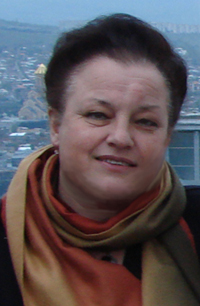
Olha Pedan Slyepukhina
While protests rage in Ukraine, many Ukrainian teachers are committed to introducing new human rights educational materials to their classrooms.
Olha Pedan Slyepukhina has taught middle- and high school history and social studies for 32 years in Ukraine. She was first introduced to the Shoah Foundation in 2007, participating in a teaching seminar called “Encountering Memory” about the film Spell Your Name, which was produced by the Shoah Foundation.
In November 2013, Slyepukhina participated in a teacher training workshop in Kyiv on the use of a new multimedia teacher’s guide titled Where do Human Rights Begin: History and Contemporary Approaches. The comprehensive multimedia teacher’s guide was approved by Ukraine’s Ministry of Education and Science in November 2013, and authored by educator Oleksandr Voytenko, historian Mikhail Tyagly and human rights education specialist Serhiy Burov. The guide features a video component on DVD consisting of excerpts of testimonies of survivors of totalitarian regimes from USC Shoah Foundation’s Visual History Archive, and testimonies of forced labor victims from EVZ’s “Forced Labor 1939-1945: Memory and History” archive.
“This program is a very important new step in teaching human rights through visual testimonies,” Slyepukhina said. “It is also the possibility to continue to work with testimonies not only in teaching about Holocaust, tolerance or genocide, but about human rights – a very actual topic of the day.”
Slyepukhina said she has taught about the Holocaust, racism and genocide before, but social stereotypes and prejudices in society make it difficult to teach about such subjects or help people overcome their attitudes and behave in a different way.
She said she is often moved to tears while watching the Shoah Foundation testimonies included in Where do Human Rights Begin.
Although the history and social studies curriculum in Ukraine is “overloaded,” the Where do Human Rights Begin materials can be incorporated subtly into existing classroom activities or offered as optional or after-school activities, Slyepukhina said.
Other teachers should use Where do Human Rights Begin in their own classrooms because it offers an alternative to traditional, formal educational methods, she added.
“It makes classes attractive for pupils and stimulates them to notice how human rights work in everyday life around them,” Slyepukhina said.